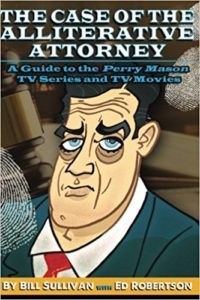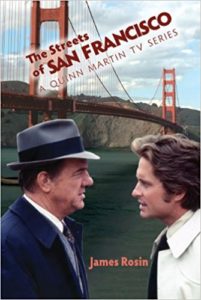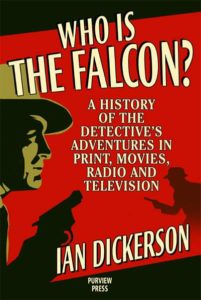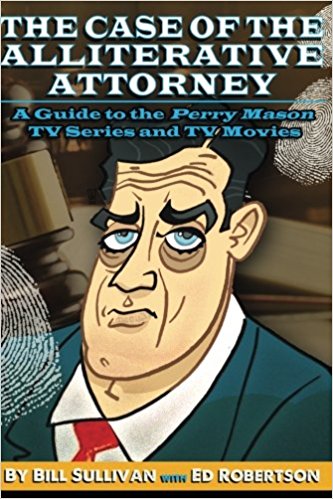 The Case of the Alliterative Attorney: A Guide to the Perry Mason TV Series and TV Movies by Bill Sullivan and Ed Robertson. The mammoth, 700-page size of this substantial TV reference work befits the big man Raymond Burr and his long-running series. It’s a great, breezily-written book from two solid pros that’s well-sourced with original interviews and is full of detailed, useful information on each episode of the original series and the TV movies… including “expert testimony” from the writers, actors, directors and producers. There’s something here for everyone — the casual fan, students of television history, and anyone interested in the machinations behind the production of a successful television series. My one quibble is that only two-and-a-half pages are devoted to The New Perry Mason (I should disclose those pages include a quote from me and I am thanked in the acknowledgments). I wish the authors had done a detailed drill-down into the show, discussing its doomed production and analyzing its episodes with the same sharp focus that they gave the Burr-centric programs. Then again, I may be the one person still living who was a fan of the reboot. This is a must-have for any Perry Mason fan and belongs on the shelf of any TV reference library.
The Case of the Alliterative Attorney: A Guide to the Perry Mason TV Series and TV Movies by Bill Sullivan and Ed Robertson. The mammoth, 700-page size of this substantial TV reference work befits the big man Raymond Burr and his long-running series. It’s a great, breezily-written book from two solid pros that’s well-sourced with original interviews and is full of detailed, useful information on each episode of the original series and the TV movies… including “expert testimony” from the writers, actors, directors and producers. There’s something here for everyone — the casual fan, students of television history, and anyone interested in the machinations behind the production of a successful television series. My one quibble is that only two-and-a-half pages are devoted to The New Perry Mason (I should disclose those pages include a quote from me and I am thanked in the acknowledgments). I wish the authors had done a detailed drill-down into the show, discussing its doomed production and analyzing its episodes with the same sharp focus that they gave the Burr-centric programs. Then again, I may be the one person still living who was a fan of the reboot. This is a must-have for any Perry Mason fan and belongs on the shelf of any TV reference library.
The Streets of San Francisco by James Rosin. Usually I steer clear of Rosin’s TV books, which are notoriously sloppy, slim, cheap-looking, poorly researched and pretty much worthless as reference material for anyone with access to Google (and outrageously over-priced as well). But since Brash Books, the publishing company that I founded with Joel Goldman, owns the underlying rights to the TV series, I felt an obligation to read this. I’m delighted to say that the book is pretty good (though it’s poorly copyedited and fact-checked.  For example, he lists Michael Douglas as a cast member in an episode long after he left the series). It’s filled with interesting production information gleaned from interviews with the cast and crew, some freshly done by the author himself while other quotes are lifted from previously published books and articles. It’s an enjoyable, informative read for fans of the show as well as students of television that benefits enormously from the insights provided by writer-producer John Wilder. I especially liked the details on script development.
For example, he lists Michael Douglas as a cast member in an episode long after he left the series). It’s filled with interesting production information gleaned from interviews with the cast and crew, some freshly done by the author himself while other quotes are lifted from previously published books and articles. It’s an enjoyable, informative read for fans of the show as well as students of television that benefits enormously from the insights provided by writer-producer John Wilder. I especially liked the details on script development.
There’s actually real meat-on-the-bones this time and, I hope, it’s a sign that Rosin is taking his TV scholarship, and the books he publishes, much more seriously. My only reservations, aside from the sloppy proofing and sticker shock, is that I wish he’d examined in much greater detail the creation, production and demise of Bert D’Angelo: Superstar, the short-lived spin-off from Streets of San Francisco and the development, writing, and production of 1991 revival movie, Back to the Streets of San Francisco. He also makes no mention of the written, but unshot, second Back to the Streets of San Francisco movie (I once had a copy of William Robert Yates’ script because, in full disclosure, he was considering me & William Rabkin as writers for the third one) or the 2007 written, but unproduced, CBS pilot for a proposed reboot.
 Who is The Falcon by Ian Dickerson. I am cheating a bit including this book in an overview of TV reference books since The Falcon didn’t make much of an impact on the small screen…certainly not the way it did on the big screen. But it’s still a fascinating read, covering a character few people today are familiar with and that many dismiss, perhaps unjustly, as a blatant and crass rip-off of The Saint. That said, it’s probably thanks to the many associations between The Falcon and The Saint films, including sharing the same studio and actors, that the character is remembered at all. It certainly explains why renowned Saint expert Ian Dickerson tackled the book, which works as both the business and creative story behind the success and failure of a franchise character and makes it fascinating reading whether you are familiar with The Falcon or not.
Who is The Falcon by Ian Dickerson. I am cheating a bit including this book in an overview of TV reference books since The Falcon didn’t make much of an impact on the small screen…certainly not the way it did on the big screen. But it’s still a fascinating read, covering a character few people today are familiar with and that many dismiss, perhaps unjustly, as a blatant and crass rip-off of The Saint. That said, it’s probably thanks to the many associations between The Falcon and The Saint films, including sharing the same studio and actors, that the character is remembered at all. It certainly explains why renowned Saint expert Ian Dickerson tackled the book, which works as both the business and creative story behind the success and failure of a franchise character and makes it fascinating reading whether you are familiar with The Falcon or not.

I’ve recently had the exciting task of proof reading ‘Beyond the Mirror Image’ – a fan created, self-published guide to the TV series ‘Quantum Leap’ by Matt Dale, now available via http://www.tmebooks.uk. I was bowled away with how thorough and detailed this guide is, and how accurate. Dale may be an enthusiast rather than a commissioned author, but his approach is completely professional. You couldn’t hope for a more comprehensive companion to this wonderful series from the late 80s/early 90s. The series may not be in your usual genre, but you should really check it out.